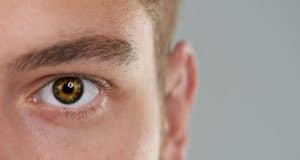
Welcome to the Laser Eye Center, where we prioritize your vision health. If you’ve ever wondered what it means to have 20/400, 20/200, 20/100, or 20/30 vision, you’re in the right place. Let’s delve into these terms and what they signify about your eyesight.
What Does It Mean to Have 20/400 Vision?
Having 20/400 vision means that what a person with normal vision can see from 400 feet away, you need to be 20 feet away to see clearly. This level of vision impairment is classified as severe and is often considered legally blind. However, this doesn’t mean a person with 20/400 vision has no vision at all. Many can still perceive light, colors, and shapes but with significantly reduced clarity.
People with 20/400 vision often require strong prescription lenses or other corrective measures to improve their sight. Daily activities, such as reading, driving, or recognizing faces, can be challenging. It’s essential for individuals with this level of vision impairment to seek regular eye exams and consultations with eye care professionals. At the Laser Eye Center, we offer a variety of treatments, including advanced surgical options, to help manage and improve this condition.
What Does It Mean to Have 20/200 Vision?
20/200 vision is another threshold for legal blindness. If you have 20/200 vision, you see at 20 feet what someone with normal vision sees at 200 feet. This level of impairment can significantly affect daily activities such as reading, driving, and recognizing faces. With this vision level, individuals often rely on corrective lenses or other aids.
People with 20/200 vision may find it challenging to perform everyday tasks without assistance. Corrective options such as glasses or contact lenses are commonly used to enhance vision. Additionally, surgical procedures like LASIK or PRK can be considered for long-term improvement. At the Laser Eye Center, our specialists are dedicated to helping you find the best solution to meet your vision needs and improve your quality of life.
What Does It Mean to Have 20/100 Vision?

20/100 vision indicates that you need to be at 20 feet to see what a person with normal vision can see at 100 feet. While not as severe as 20/200 or 20/400, 20/100 vision still poses challenges, especially for tasks requiring clear distance vision. People with 20/100 vision might find it difficult to drive without corrective lenses.
For individuals with 20/100 vision, glasses or contact lenses are often necessary to achieve better clarity. These corrective measures can significantly improve the ability to see and perform daily tasks more comfortably. Advanced treatments, including laser eye surgery, are also available at the Laser Eye Center. Our team of experts will work with you to determine the best approach to enhance your vision and ensure you can enjoy life to the fullest.
What Is 20/30 Vision? Is It Bad?
20/30 vision means you can see at 20 feet what a person with normal vision sees at 30 feet. This level of vision is slightly below average but is often still considered within the normal range. For most activities, 20/30 vision is usually not problematic, though some might experience minor difficulties with tasks requiring sharp vision.
Having 20/30 vision might not necessitate immediate corrective action, but it’s important to monitor any changes in your vision. Regular eye exams can help detect any deterioration early on, allowing for timely intervention. If you’re experiencing discomfort or difficulty with 20/30 vision, it may be worth discussing corrective options with our specialists at the Laser Eye Center.
Common Causes of Vision Impairment
Vision impairment at any level can result from various factors, including genetics, aging, diseases, or injuries. Common conditions that lead to impaired vision include myopia (nearsightedness), hyperopia (farsightedness), astigmatism, and presbyopia. Regular eye exams are crucial in identifying and managing these conditions early, ensuring that any vision loss is addressed promptly.
- Myopia (Nearsightedness): This condition causes difficulty in seeing distant objects clearly. It is often hereditary and can worsen with age.
- Hyperopia (Farsightedness): Individuals with hyperopia can see distant objects clearly but struggle with near vision. This condition can be present from birth.
- Astigmatism: This is caused by an irregularly shaped cornea or lens, leading to blurred vision at any distance.
- Presbyopia: Age-related loss of the eye’s ability to focus on close objects, usually becoming noticeable in the early to mid-40s.
How We Can Help
At the Laser Eye Center, our goal is to provide personalized care tailored to your unique vision needs. We offer comprehensive eye exams, advanced diagnostic tools, and a variety of treatment options. From prescription eyeglasses and contact lenses to cutting-edge laser eye surgery, our experienced team is here to help you achieve optimal vision.
Our approach is patient-focused, ensuring that you receive the care and attention you deserve. We understand that each patient’s vision needs are different, and we strive to provide solutions that best suit your lifestyle and preferences.
Advanced Treatments Available
For those with significant vision impairment, advanced treatments such as LASIK, PRK, and other refractive surgeries can offer significant improvement. These procedures reshape the cornea, allowing light to be properly focused onto the retina, thus enhancing vision clarity. Our specialists will guide you through the best options based on your specific condition and lifestyle needs.
- LASIK (Laser-Assisted In Situ Keratomileusis): This popular procedure corrects vision by reshaping the cornea using a laser. It is suitable for myopia, hyperopia, and astigmatism.
- PRK (Photorefractive Keratectomy): Similar to LASIK, PRK reshapes the cornea but does not involve creating a flap. It is an excellent option for individuals with thinner corneas. slot thailand.
- Refractive Lens Exchange (RLE): This procedure involves replacing the eye’s natural lens with an artificial one, particularly beneficial for those with severe refractive errors or presbyopia.
Lifestyle and Vision Health
Maintaining good vision health goes beyond corrective measures. A healthy lifestyle, including a balanced diet rich in vitamins A, C, and E, regular exercise, and avoiding smoking, can support eye health. Protecting your eyes from excessive UV light with sunglasses and taking breaks from screens can also prevent strain and long-term damage.
- Diet: Consuming foods rich in antioxidants and omega-3 fatty acids can promote eye health. Leafy greens, fish, nuts, and fruits are excellent choices.
Exercise: Regular physical activity improves blood circulation, which benefits the eyes and overall health. - UV Protection: Wearing sunglasses that block 100% of UV rays helps protect your eyes from harmful radiation.
- Screen Breaks: Follow the 20-20-20 rule: every 20 minutes, look at something 20 feet away for at least 20 seconds to reduce eye strain.
Take the Next Step Towards Clearer Vision
Your vision is vital to your quality of life. If you or a loved one are experiencing any level of vision impairment, don’t wait to seek help. Contact the Laser Eye Center today to schedule a comprehensive eye exam and consultation. Our dedicated team is ready to help you explore the best options for your vision needs, ensuring you enjoy the clearest vision possible.
Our state-of-the-art facility and experienced staff are committed to providing exceptional care and personalized treatment plans. Whether you need corrective lenses, surgical options, or routine eye care, we are here to support you every step of the way.
Schedule a consultation today by call our office or requesting an appointment via our convenient online form.
Schedule your free consult today
Click here to learn moreGet started on your journey to clearer, crisper vision with Laser Eye Center™. Our expert team of doctors are trained and skilled in the latest technology and methods for laser vision correction. To learn more about our state-of-the-art All Laser LASIK technology or about All Laser LASIK itself, contact us today. Schedule your FREE All Laser LASIK consultation by calling today.

